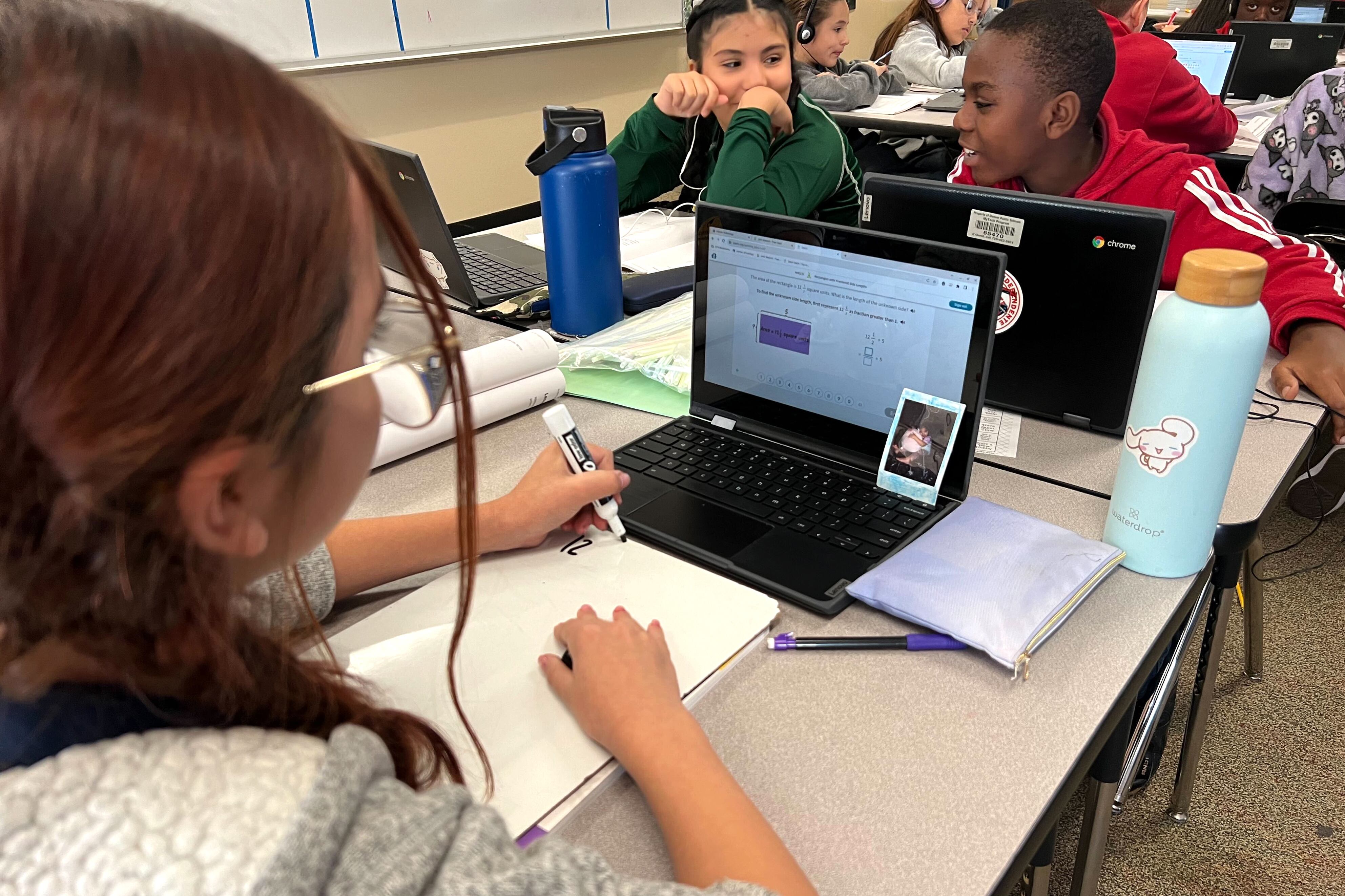Sign up for Chalkbeat Colorado’s free daily newsletter to get the latest reporting from us, plus curated news from other Colorado outlets, delivered to your inbox.
As camera shutters clicked and politicians and policymakers huddled in the back of a Denver classroom Thursday, Colorado Gov. Jared Polis walked between the desks of sixth graders whose eyes and ears were glued to their computer screens, multiplying fractions.
The program the students were using, Zearn Math, is a key part of Polis’ plan to boost math scores in Colorado and help students recover from the pandemic. Just 1 in 3 students scored at grade-level in math on state tests last spring.
Polis was at Marie L. Greenwood Early-8 in far northeast Denver to hype Zearn in the hopes that more school districts will adopt the program, which the state is offering to schools for free this year. About 65% of Colorado districts are already using it, Polis said.
“We want to really take this opportunity to get the message out across the state: We would love that other 35% of schools to also take advantage of what the state is supporting,” he said.
And districts will have another year to do so. Polis announced Thursday that the state is investing an additional $3 million in federal COVID relief, on top of the $6 million in COVID aid it already set aside, to extend to the 2024-25 school year the offer to pay for Zearn licenses. The state has also been paying to train teachers to use the digital platform.
“We know this will lead to major improvements in math achievement,” Polis said, “which is so important for success in today’s world. Whether you go to college or not, no matter what field you enter, basic math skills — numeracy — is so incredibly important.”
Noire Lin, the teacher whose classroom Polis visited, said in an interview that Zearn has helped students “take more charge of how they’re learning.” Lin’s students — and all students at Greenwood — use Zearn for 30 minutes a day, three times per week.
“It’s aligned to what I teach in class,” Lin said. “But sometimes they’ll go home and be like, ‘I really don’t know if the teacher was teaching it correctly to me.’ So they go home [and] they do Zearn. They get to watch a video. They get to have step-by-step breaking down the problems.”
Colorado Department of Education officials said the state doesn’t yet have data showing whether Zearn is making a difference since schools started using it this fall. The governor’s team chose Zearn without running a competitive bidding process, based on studies provided by the company that showed students who used Zearn regularly made more progress than those who didn’t.
After Polis left, several of the 11-year-olds in Lin’s class gave Zearn mostly positive reviews.
Kevin Villalba said he likes “the sprint,” which is when Zearn gives students a limited amount of time to answer as many math questions as they can. Mia Villa likes the practice questions, and how, if she gets an answer wrong, Zearn explains why and shows her the right steps.
“I sometimes have trouble with math,” Villa said. “Before I had a D or a C, and now I have a B or an A in math.” Zearn, she added, “helps a lot of kids get better in their math.”
But across the table, Valeria Sierra said she’s “not that big of a fan.”
“It could be stressful,” Sierra said, especially a Zearn feature called “the tower of power.”
“If you do a mistake, it removes all your progress,” Sierra said. “And at the same time, it’s kind of hard because it’s a little bit different [from] how our teachers teach us math. And it’s sometimes difficult because the videos they show us doesn’t explain that much.”
Melanie Asmar is a senior reporter for Chalkbeat Colorado, covering Denver Public Schools. Contact Melanie at masmar@chalkbeat.org.






